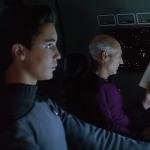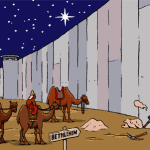Before I dive into this episode from the Tom Baker era, let me draw attention to an article by a Butler University graduate, Emily Swan, who wrote about the most recent season of Doctor Who’s engagement with God and theology. Here’s a snippet:
It seems natural that any show running as long as Doctor Who would need updates from time to time. And it seems natural that any show with a messianic figure like the Doctor would need amending as our cultural understandings of the Divine evolve. But I will say this: I feel both excited and sorry for Jodie Whittaker and cast, because they embody symbols deeply embedded in our human psyches. Anytime you mess with significant sacred symbols, some people will be ecstatic and others will be livid. Like, hot lava livid. And that social anger will be projected onto those embodying the changes. It’s worth doing, and I applaud them for the courageously prophetic act of helping us re-imagine society and faith and what it means to be human.
“The Power of Kroll” is an episode in the larger Key to Time sequence, in which the Doctor and Romana undertake a search for fragments of this object, hidden through out space and time, a mission entrusted to them by a figure who identifies himself as a the White Guardian. The idea of a White Guardian and a Black Guardian itself connects this series of episodes with religious themes – powerful godlike entities who are either diametrically opposed (as in Zoroastrianism) or need to be in balance (as in Taoism). This episode likewise engages prophetically with religion and cultural values in important ways. The episode explicitly says that some of the questions characters raise are “blasphemous questions.” Sometimes those are the best kind, or at least the most important.
The episode focuses on a world which humans have colonized, and non-human native population the humans refer to as “Swampies” and describe as “savages.” The humans are there to exploit the planet, and of course claim to be making things better for the natives in the process. The Swampies had been moved there previously by the Delta Magna Earth colonists when they thought this moon was no use to anyone. Now they have a methane refinery and are producing protein, and so are disrupting their lives once more.
In this context, the Doctor utters a phrase that has a wide applicability beyond the show’s narrative when he says, “Well… progress is a very flexible word. It can mean pretty much anything you want it to.”
There’s also a great moment when the Doctor finds a book that details the history of the Swampies:
ROMANA: What’s that you’ve got?
DOCTOR: I think it’s an illustrated history of the tribe. A sort of Bayeux tapestry with footnotes.
ROMANA: Oh, a sort of Holy Writ.
DOCTOR: I think it’s atrociously writ, but the pictures aren’t bad. Look. That shows them being evicted from Delta Magna.
ROMANA: Where they originally came from.
DOCTOR: That’s right, yes. They were given this moon as a sort of reservation. Look, there you are. There’s Kroll in his aquarium. What did I tell you? Sucker marks.
ROMANA: What’s the footnote?
DOCTOR: Hmm? Let me see. And Kroll. When Kroll awakened, he saw that the people were fat and indolent, and then Kroll became angry and he struck them down, swallowing into him the symbol of his power and killing all who were in the temple, even Hajes the priest. Great was the lamentation of the people but Kroll returned to the water and slept.
ROMANA: Oh, I like a book with a happy ending.
There’s great content in this episode, regardless whether you’re interested in Doctor Who’s treatment of religion, its engagement with politics and colonialism, environmentalism, or anything else. The episode gives you a radical environmentalist group called the “Sons of Earth” who are said to be arming the swampies. There is a ceremony that intends to offer a blood sacrifice to Kroll. There is a fake giant squid, a masquerade undertaken for political reasons. Kroll is referred to by the inhabitants of the planet as their God and savior, and they seek to appease his wrath. Kroll’s attack is interpreted as a sign of his displeasure. And there are statements such as “All life began on mother Earth, all life is sacred” and “Those are blasphemous questions.”
How many of the readers of this blog are familiar with this episode from the Tom Baker era? It seems every bit as relevant now as it must have when it first aired, if not indeed more so.
















